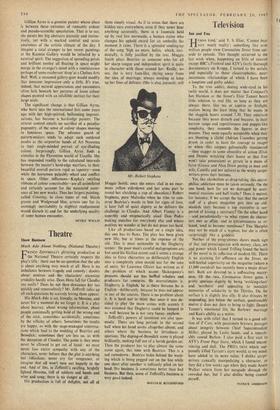Television
Ian and Ena •
UMAN kind,' said T. S. Eliot, 'Cannot bear very much reality'; something like nine million people view Coronation Street from epi- sode to episode. This thought occurred to me last week when, happening on little of interest except BBC's Firebird and ATV's fairly thorough documentary on Krupp, I turned to the serials,
and especially to those claustrophobic, near- incestuous relationships of which I have been a longtime and guilty addict.
To the true addict, dozing wide-eyed in his
twilit world, it does not matter that Compact's Ian Harmon or the Street's Elsie Tanner bears little relation to real life, so long as they are always there, like tea or aspirin or firelight. realism being the least thing that he wants in the sluggish hours around 7.30. They entertain because they never disturb and because, in their narrow range and repetitiveness and puppet-like simplicity, they resemble the figures in day- dreams. They seem equally acceptable when they are blunting a Cliché (Adrian Coombes getting drunk in order to have the courage to resign) or when--like corpses galvanically reanimated —they stagger to some absurdity of action (Elsie and Dennis wrecking their house so that Ena won't take possession) or gyrate in a maze of farce (Gussie and Alan Drew posing as man and wife, Camilla and her suitors) as the weary script- writers press their buttons.
Yet, like alcoholism or drug-taking this necro- philiac addiction must be taken seriously. On the one hand, how far are we damaged by senti- mental evasions and half-truths? Does it matter, for instance, if we accept the fact that the entire staff of a glossy magazine gets into an •old- maidish tizzy because a top executive is sus- pected of kissing a secretary? On the other hand —and paradoxically—to what extent do charac- ters met so often, and in circumstances so re- ' lazed, tend to become numinous? Ena Sharpies may not be much of a woman, but she is often surprisingly like a goddesS. Neither of the programmes shows much sign of that real preoccupation with money, class, sex aqd power which Lionel Trilling found the basis of the novel in its reflection of modern life. There is no straining for affluence on the Street, no well-heeled superiority on the magazine (where a £1,000 overdraft has recently been a major disas- ter). Both are devoted to a suffocating matey- ness. Of the two, Coronation Street gains a pretty spurious dignity by being 'working-class' and 'northern' and appealing to nostalgic memories of solidarity in the Thirties. On the surface it is slightly less silly. It also titivates by suspending, just below the surface, questionable matter it does not dare to bring to light; Dennis Tanner's emotional life, the Barlows' marriage and Ken's ability as a writer.
14 was with relief that I turned to a good edi- tion of Z Cars, with passionate bravura passages about integrity between Chief Superintendent Miller, played by Leslie Sands, and a remark- ably cowed Barlow. I also paid a first visit to ATV's Front Page Story, which 1 found uncon- vincing and dull. The PRO's twist which sup- posedly killed Tarrant's story would, to my mind, have added to its news value. I dislike script- writers cynically manipulating a character, as they did a few weeks ago when they made Annie Walker return from her escapade through the crowded bar, but I also dislike being conned myself.
PATRICK ANDERSON


































 Previous page
Previous page